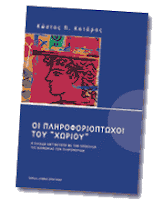
”Business is a necessary evil in society… only the worst sorts of people are involved” (Plato)
Corporate power, accumulated by the US lead “Arrogant Capitalism” of the inequalities, is dramatically deteriorating, also as a result of the recent financial crisis. “Disaster Capitalism”(see Naomi Klein’s latest book) and the School of Chicago failed. Now a European lead “Nice Capitalism”(see Costas Kataras latest book) is wanted. Long before the crisis, a number of studies showed a growing lack of trust in business and their leaders, ie only ¼ of the public trust them. Further on, brand importance goes also steadily down. Fo
 r example, brand loyalty today is only 9%, from 40% some years ago. The crisis also showed that the notion of “Powerless State” is a myth. Society is now pressing harder for a new “corporate social contract “ and the new issues for the businesses are endless, including: regulation, environment, unions, privacy, safety, off shoring, civil society, governments as owners, consumer activists , NGOs and others . How modern corporations could respond to these strategic and organizational challenges, beyond simplistic CSR, “Green Wash” practices and the recently invented by brands concept of “social missions in the supermarket shelf”, at a moment where “shareholder value is growing increasingly irrelevant as government and society take a larger role in shaping business and industry” ? The above were some of the topics of the recent lecture, 14/12/2009, of Costas Kataras in the Athens Univ
r example, brand loyalty today is only 9%, from 40% some years ago. The crisis also showed that the notion of “Powerless State” is a myth. Society is now pressing harder for a new “corporate social contract “ and the new issues for the businesses are endless, including: regulation, environment, unions, privacy, safety, off shoring, civil society, governments as owners, consumer activists , NGOs and others . How modern corporations could respond to these strategic and organizational challenges, beyond simplistic CSR, “Green Wash” practices and the recently invented by brands concept of “social missions in the supermarket shelf”, at a moment where “shareholder value is growing increasingly irrelevant as government and society take a larger role in shaping business and industry” ? The above were some of the topics of the recent lecture, 14/12/2009, of Costas Kataras in the Athens Univ ersity of Economics and Business, MBA International Program, about Business and Society. You can access his presentation here. The lecture was part of the "Nice Way" strategy series.
ersity of Economics and Business, MBA International Program, about Business and Society. You can access his presentation here. The lecture was part of the "Nice Way" strategy series.The Nice Way initiative of The Costas Kataras Organization includes information, ideas and advice equipping organizations for a competitive advantage in times of turbulence, delivered through a number of tools, including: lectures, presentations, seminars, workshops, strategic foresight, scenario planning, studies, market intelligence, consulting, counselling, networking tools and others, based on Costas Kataras’ fascinating book Nice Capitalism. Lecture topics include: A New Paradigm: The Application of “Chaos Thinking” to Strategy, The European Effect: Is Corporate Europe Beginning to Surpass America? , Restoring Confidence in the Corporation: Rethinking the Business of...Business, The Uncertain Future of Brands: The Next Colossal Corporate Challenge?, The Economics of Happiness: Mastering the New Competitive Advantage ,The Revenge of the Psych: Is Consumers’ Dominance Over Corporations Near?, Rethinking Marketing: Surviving in a New, Polarized, World. More info and a short description of the Nice Way series of lectures, is now availiable.

















